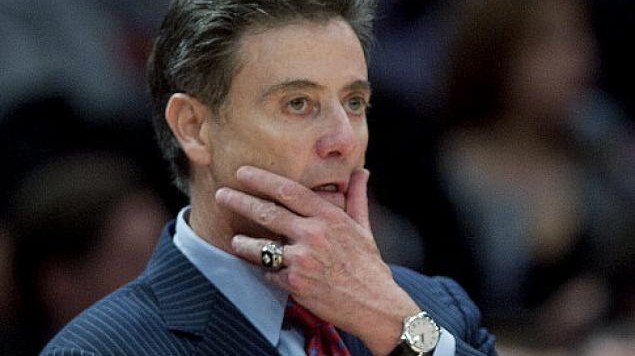It comes up nearly every time a high-profile program runs seriously afoul of the NCAA’s Byzantine set of rules and regulations governing the multibillion-dollar college sports industrial complex. Scholarships get docked, postseason bans are implemented, and complaints start ringing out about such a hamfisted system of justice.
Not surprisingly, college hoops legend Rick Pitino became the latest to take up the cause over the weekend. After learning that his team wouldn’t be allowed to play in the postseason this year in connection with a recruiting sex scandal, Louisville’s men’s basketball coach blew his stack over the “broken” system penalizing innocent bystanders for the sins of their predecessors.
Pitino’s alternative to the current punishment scheme is nothing revolutionary: Instead of taking away scholarships or implementing postseason bans, impose substantial fines on the school and the head coach. It should be noted that the NCAA and schools have incorporated financial penalties in sanctions before, such as Jim Tressel’s punishment for his involvement in Tattoogate at Ohio State. The NCAA even added guidelines for financial penalties to its enforcement reforms in 2013.
It sounds like a reasonable solution that would keep players and coaches who had nothing do with past misdeeds free and clear of the repercussions. But “financial penalties alone” also sounds completely infeasible.
For argument’s sake, let’s assume we could devise some type of equitable fine structure for infractions. How does the NCAA ensure that the money for such fines comes from the right places within the athletic department?
Put another way, if the men’s basketball program breaks the rules, it’s impossible for the NCAA to ensure that a school pays for the resulting fines out of that program’s pocket. It doesn’t have that level of authority over any school’s budgeting, which opens up the possibility of using everything from funding for non-revenue sports to student fees to teachers’ salaries to pay off the fines.
If that’s not enough, think about the message it would send to the public if cheating were reduced to a matter of dollars and cents for the schools.
Ironic as they may be, the NCAA’s stated core values cover concepts like integrity, sportsmanship and fairness. In theory, its rules exist to promote competitive equity among its member schools. Therefore, it would fly in the face of the institution’s avowed mission if it were to turn compliance into an exercise in economic risk management for the schools.
When innocent players get caught in the crossfire over scandals such as the one currently playing out at Louisville, it’s unfair. No one should dispute that.
Unfortunately for the bystanders, scholarships and postseason events – not cash – are the NCAA’s best targets to deter cheating.

